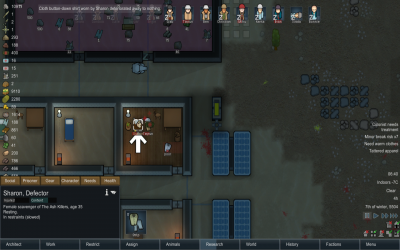Clothing
|
Clothes is a category of Apparel. For general properties, see there.
Clothing Values
Clothes are made from fabric and leather. While its stats vary heavily based on the material, clothing offers little protection from violence, but very good insulation.
Material
Picking the right material for any piece of clothing is far from arbitrary and the default setting will just have nearly all materials checked. The algorithm by which the crafter picks which material to use is unknown.
Farbrics
Cloth is the most accessible material when wildlife is scarce. It can also be easily farmed from cotton plants or cheaply bought. It is used as baseline material in Crafting Bill Hints.
Advanced fabrics tend to have way better armor values and at least comparable thermal resistance values, meaning they can easily replace cloth in every application but are harder to come by.
Wools
Wool is a subtype of Fabric. Can only be acquired from domesticated animals, and have high Thermal Multipliers. It offers very weak protection and is highly flamable. Care must be taken to not mix up the Wool and Leather from an animal, as those have very different values.
Leathers and Skins
Leathers offer pretty good defense and are easy to acquire in most biomes as a sub product of hunting. Leather are defined by the type of animal they were taken from. While they generally provide good armor, their thermal resistance tends to be all over the place - way below and way above cloth. They always have a high Flame and Blunt damage resistance, with low flammability.
Headgear Table
Unlike other clothing, headgear is made alsmost exclusively from Fabric.
| Name | Complex Clothing | Fabric | Leathery | Sharp | Blunt | Heat | Cold Insulation | Heat Insulation | Special | Upper Head | Full Head |
|---|---|---|---|---|---|---|---|---|---|---|---|
| Cowboy Hat | Y | Y | Y | 20% | 20% | 20% | 10% | 50% | +10% Social Impact | Y | N |
| Bowler Hat | Y | Y | Y | 20% | 20% | 20% | 10% | 40% | +15% Social Impact | Y | N |
| Tribal Headdress | N | Y | N | 20% | 20% | 20% | 10% | 15% | +15% Social | Y | N |
| Turque | Y | Y | N | 20% | 20% | 20% | 50% | 0% | Nothing | Y | N |
| Tribal War Veil | N | Y | N | 20% | 20% | 20% | 5% | 5% | +5 Pain Schock Treshold | N | Y |
Body table
| Name | Fabric | Leathery | Armor | Cold Insulation | Heat Insulation | Upper Body | Lower Body | On Skin | Middle | Shell |
|---|---|---|---|---|---|---|---|---|---|---|
| Tribal | Y | Y | 20% | 55% | 55% | Y | Y | Y | ||
| Parka | Y | Y | 20% | 200% | 0% | Y | Y | |||
| Pants | Y | Y | 20% | 20% | 8% | Y | Y | |||
| T-Shirt | Y | Y | 20% | 22% | 10% | Y | Y | |||
| Button Down Shirt | Y | Y | 20% | 26% | 10% | Y | Y | |||
| Duster | Y | Y | 30% | 60% | 85% | Y | Y | Y | ||
| Jacket | Y | Y | 30% | 80% | 30% | Y | Y |
Common Combinations
On Skin Layer
This layer is dominated by two options: Tribalwear or Shirt + Pants
Tribalwear offers the best thermal insulation. Meanwhile, Shirt+Pants in turn has better armor values and coverage. The T-Shirt is an inferior version of the button down shirt and should be avoided unless its reduced material cost is helpful.
Middle
The middle layer is not used by any clothing. It is primarily the realm of Armors, which use it to lock out against another.
Shell
The Shell layer is primarily for armor and additional clothing layers. They can be combined with shirts, Flak Pants, and Flak Vest.
The Parka is the perfect option for Cold Resistance, as it outright doubles the material values. Accordingly, it should be always made from whatever material has the highest base values.
The Duster is a cowboy attire. Aside from good heat insulation, it also offers decent protection.
The Jacket is a common item. Crashlanded survivors start with one. It is a good balance between protection and insulation.
